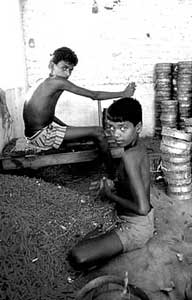
Voices of children
 |
Voices of children
|
 1996 - 2001 © David Brown International Labour Organisation (ILO)
|
Who made your dress? A new garment factory opened up recently in Tomas' neighbourhood. The factory used to be in another country, but the owner decided that the wages were too high there. He moved the factory to Tomas' country where he could pay workers less and make more profits. Tomas is 13 years old. Along with 10 other children his age, Tomas makes bridal gowns and fancy dres-ses. On the other side of the world, brides-to-be shop for the gowns that Tomas and other children produce, and students buy the fancy dresses for graduation parties, probably not realising that they are made by children who never had a chance to go to school, let alone celebrate graduation. Tomas and the other children in his factory are protected by government legislation - for example, they're supposed to get time off to go to school, and they're supposed to work a maxi-mum of 35 hours each week. But in reality, they can't keep their jobs unless they put in about a 60-hour work week. They are not paid any overtime and, in some cases, they are not even paid the basic minimum wage. No medical care is provided, either. According to Tomas, "We are treated the same as the adults in what is demanded of us and we are treated worse in what we receive."
Based upon materials provided by UNITE! Union of Needletrades, Industrial and Textile Employees, AFL-CIO, CLC, New York, USA. A US farm worker tells her story My name is Belinda and I am 14 years old and currently attending Queen Anne' High School. I am an American farm worker. For the past thirteen years I have been migrating from Mission, Texas to the eastern shore of Maryland. The worst part about migrating is having to adjust everywhere I go even if I don't like it. Since my first year in school I have had to change schools twice a year. For me there is no such thing as a summer vacation. Once school is out we pack our things and head to Maryland to find work. We have to work every single day because we need the money for food and bills. Three years ago, at the age of 11, I started working in the fields picking squash and bell peppers at different farms. I work alongside my parents under the sun, huffing and puffing and aching everywhere. Sometimes there is no clean water available to help quench our thirst and most of the time there is no water available for washing our hands and faces before eating or after going to the bathroom. It is very dangerous to work in the fields because of all the pesticides that are used to control insects. On the very first day of work this season I developed a rash all over my legs. The rash made my legs very red and itchy. But even so I went to work the next day. Through farm work I have learned to be responsible and how to manage money. Picking squash gets easier day by day but the pay is low. I get 42 cents a bucket but have to pick at least 60 buckets to make it worthwhile. A full bucket weighs about 25 pounds. No child belongs in the field and all children deserve an opportunity to enjoy their childhood. By the way, I don't eat squash because it is yucky and it reminds me of working in the fields.
Excerpted from a speech given at the National Child Labour Coalition Conference, Washington, DC, in September 1996. Child prostitution A letter from a Thai child prostitute expresses the pain of millions of girl children being inducted into the sex trade every day (provided by the Foundation for Women, Thailand):
Dear Daddy and Mom,
Walk in my shoes
Ear to the Streets, a compilation of poetry by street youth from across Canada, may be purchased from Daniel Broderick at 001-416-760 6651.
|